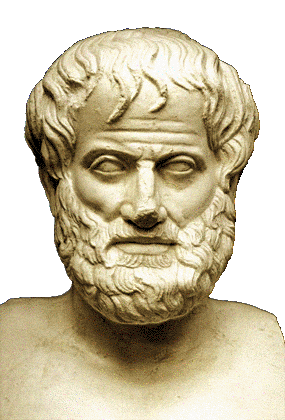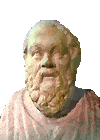sic transibat laudem litterae
A. Hassl, 1957 - ...
idols
Table of contents:
- U8.1Aristotle
- U8.2Socrates
- U8.3External adequate publications
Integration persons, which are in best accordance with my life's desire for two of the four unvarying royal-Davidic virtues, the wise teacher and the fair justice: Never by chance do all my integration figures originate from the ancient world or from the antique mythology; thus from an epoch, in which the spectrum of values specified above were also not lived always free of evil, but the endeavour to be honest constituted the value of a human living, that one of a vir bonus, at least. And aspiration for fortune in life designated a transcendental, non-monetary value.
The everlasting preceptor: Aristotle
 The meaning of the ancient Greek universal scholar and science systematiser Aristotle (384 - 322 BC) for the occidental intellectual life can be recognized by his characterisation as "the Big Cleric" by Master Eckhart (1260 -1328). Apart from many different things, he is also regarded as Father of the Parasitology, eg he can be considered as my occupational progenitor. In his history of the animals Aristotle mentions not only the human parasites, but also those from different house and game animals. Concerning the intestinal worms, he takes over the three categories of Hippocrates, flatworms, roundworms and ascarida, and perfects his specification by a detailed description of the hog associated cysticercosis (infestation by larvae of Taenia solium); he mentions thereby the stye at thighs, neck, shoulders and particularly at the tongue, but he does not know the danger, which threatens humans by eating pork from infected animals. Although Aristotle did also observe the nits, that are the eggs of lice, and the pupa of the fleas, he believed that ectoparasites develop from sweat and dirt.
The meaning of the ancient Greek universal scholar and science systematiser Aristotle (384 - 322 BC) for the occidental intellectual life can be recognized by his characterisation as "the Big Cleric" by Master Eckhart (1260 -1328). Apart from many different things, he is also regarded as Father of the Parasitology, eg he can be considered as my occupational progenitor. In his history of the animals Aristotle mentions not only the human parasites, but also those from different house and game animals. Concerning the intestinal worms, he takes over the three categories of Hippocrates, flatworms, roundworms and ascarida, and perfects his specification by a detailed description of the hog associated cysticercosis (infestation by larvae of Taenia solium); he mentions thereby the stye at thighs, neck, shoulders and particularly at the tongue, but he does not know the danger, which threatens humans by eating pork from infected animals. Although Aristotle did also observe the nits, that are the eggs of lice, and the pupa of the fleas, he believed that ectoparasites develop from sweat and dirt.
Apart from natural science studies Aristotle also dealt with philosophy, jurisprudence and public doctrine. In the first book politics he characterised a human being as a zoon politikon. He believes that man is a creature which can develop in the community, in small groups, only. He at that time already detected the meaning of the language for mankind (cit. in parts Societe d'editions professionnelles, medicales et scientifiques [1980]).
The immortal gentleman scientist: Socrates
 The philosopher Socrates (469 - 399 BC) remains, as he was in his lifetime, an enigma, an inscrutable individual, an isolated person. Despite having written down not a single word for posterity, like Jesus, he is considered one of the handful of philosophers who forever changed how philosophy itself was to be conceived. All our information about him is second-hand and most of it vigorously disputed. But, his trial and his death at the hands of the Athenian democracy is nevertheless the founding myth of the academic discipline of philosophy (= love of wisdom).
The philosopher Socrates (469 - 399 BC) remains, as he was in his lifetime, an enigma, an inscrutable individual, an isolated person. Despite having written down not a single word for posterity, like Jesus, he is considered one of the handful of philosophers who forever changed how philosophy itself was to be conceived. All our information about him is second-hand and most of it vigorously disputed. But, his trial and his death at the hands of the Athenian democracy is nevertheless the founding myth of the academic discipline of philosophy (= love of wisdom).
For Socrates nature philosophy and the fact sciences were insignificant. To him only the ethical education of its fellow citizens mattered, whom he tried to accomplish by his special technology of the questioning. However, personal virtue + VIRTUS + was not learnable for Socrates, but a gift of the Gods.
One calls the Socratian asking method Maeeutik, i.e. midwife art. Socrates had a preference for placing such questions to his interlocutor, whose simple, obvious answering afterwards always turned out as intellectually unsatisfactory and usually as factually incorrect. Thus he entangled the other one into contradictions and led him so informally to the self-realization of his ignorance. The Socratic dialogues lead to the insight, which the Greek philosopher Xenophanes formulated in a general manner in such a way, that man never possessed safe knowledge, still will ever possess. However, in a constant effort we are able to find better ones. We can reject old, insufficient solutions and we can develop new explanations, which are not perfect too, but solve better than the superseded. The theory of knowledge of natural sciences, developed by Sir Karl Popper nearly two and a half millenia later, the demand for a falsification chance, follows the same basic principle. The Socratic aspect of the reality of life is therefore very up-to-date. It is also an impressing humanitarian final speech because of its intellectual modesty in relation to the vain arrogance of fanatics and fundamentalists of all times,
Socrates influence has been felt far beyond philosophy itself, and in every age. Later on he will be called Father of the Occident. He lived modestly as academic teachers on the voluntary donations of his scholars. Because his life is widely considered paradigmatic for a sapient life and, more generally, for how anyone ought to live, Socrates has been encumbered with the admiration and emulation normally reserved for founders of religions. Weird for someone, who tried so hard to make others do their own thinking. And for someone convicted and executed on the charge of irreverence toward the gods and polis divinity (cit. in parts The Metaphysics Research Lab [2007]).
U8.3 External adequate publications
- Societe d'editions professionnelles, medicales et scientifiques [1980]: Histoire de la Medicine, de la Pharmacia, de l'Art Dentaire et de l'Art Veterinaire. pp 2934.
- The Metaphysics Research Lab [2007]: The Stanford Encyclopaedia of Philosophy. https://plato.stanford.edu/entries/socrates
 Andreas R. Hassl
Andreas R. Hassl